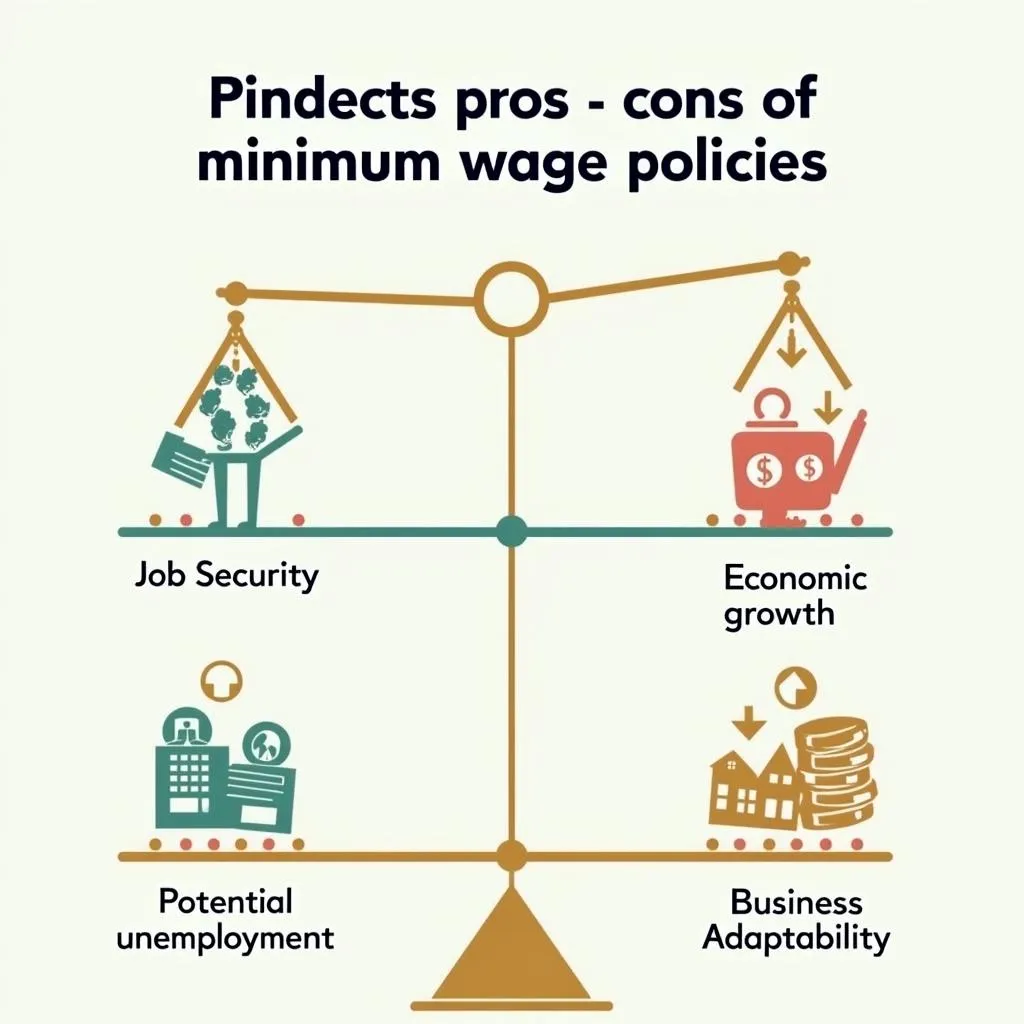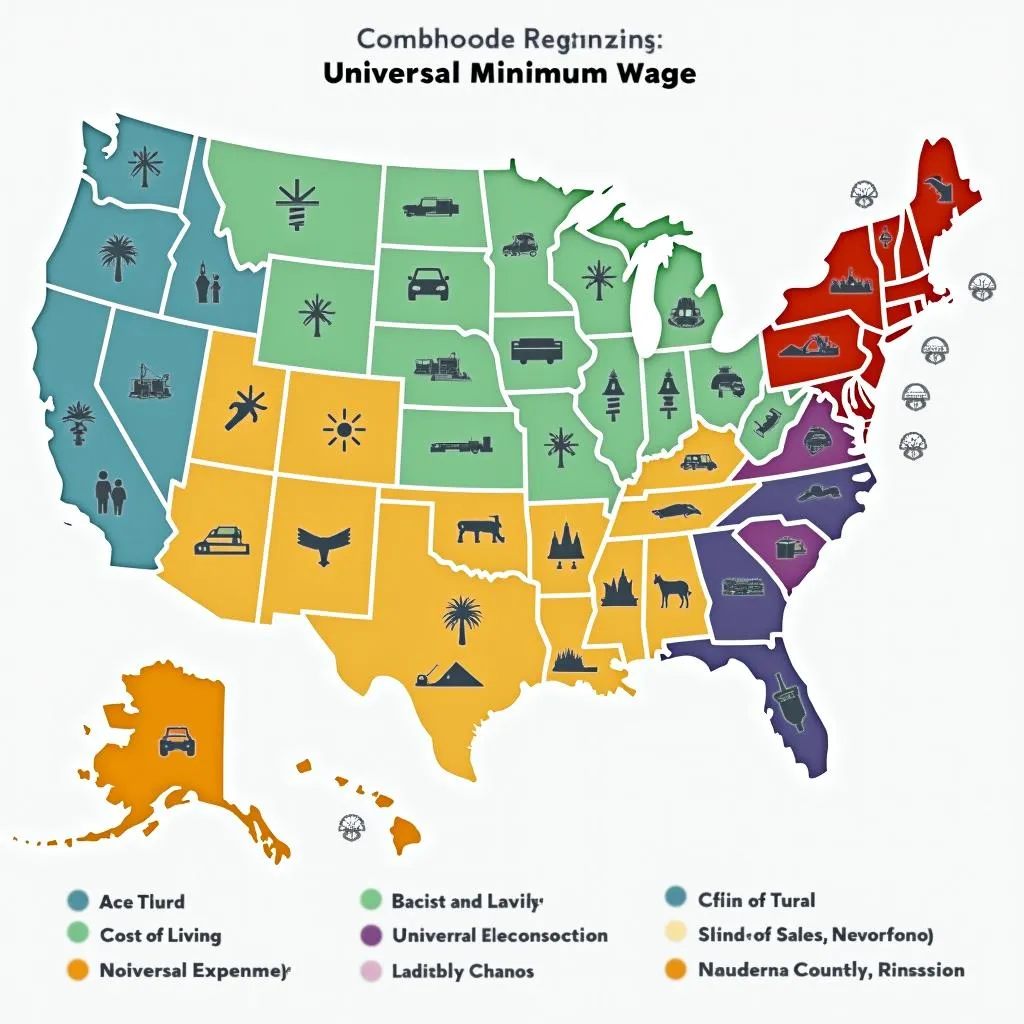The topic of whether governments should enforce a universal minimum wage is a recurring theme in IELTS Writing Task 2. Based on past exam trends and analysis of IELTS-related websites, this topic has appeared frequently and is likely to continue being a popular subject for future tests. Let’s examine a real IELTS question on this topic and provide sample essays for different band scores.
Nội dung bài viết
Some people think that governments should enforce a universal minimum wage, while others believe that this would lead to unemployment and other problems. Discuss both views and give your own opinion.
Analysis of the Question
This question presents a classic IELTS task 2 format, asking candidates to discuss two contrasting views and provide their own opinion. The topic revolves around the economic and social implications of implementing a universal minimum wage. Candidates are expected to:
- Discuss arguments in favor of government-enforced minimum wage
- Explore potential negative consequences, such as unemployment
- Provide a balanced analysis of both perspectives
- Express and justify their own opinion on the matter
Now, let’s look at sample essays for different band scores, starting with a high-band response.
Sample Essay 1 (Band 8-9)
The debate over whether governments should mandate a universal minimum wage is a contentious issue with valid arguments on both sides. While proponents argue that it ensures a basic standard of living for workers, critics contend that it may lead to increased unemployment and economic instability. In my opinion, a carefully implemented minimum wage policy can be beneficial, but it must be tailored to specific economic contexts and regularly adjusted to avoid potential negative consequences.
Those in favor of a universal minimum wage assert that it is essential for protecting workers from exploitation and ensuring a decent quality of life. They argue that without such regulations, employers might take advantage of vulnerable workers, particularly in low-skill sectors, leading to poverty and social inequality. Furthermore, a minimum wage can stimulate economic growth by increasing consumer spending power and reducing reliance on social welfare programs. For instance, studies in countries like Germany, which introduced a national minimum wage in 2015, have shown positive effects on income equality without significant job losses.
On the other hand, opponents of a universal minimum wage claim that it can lead to unemployment and other economic problems. They argue that businesses, especially small enterprises and those in labor-intensive industries, may be forced to reduce their workforce or raise prices to cope with increased labor costs. This could result in job losses, particularly among young and low-skilled workers, and potentially contribute to inflation. Critics also point out that a one-size-fits-all approach may not account for regional economic differences, potentially harming businesses in less prosperous areas.
In my view, while the concerns about potential job losses are valid, the benefits of a well-designed minimum wage policy outweigh the risks. However, implementation is crucial. Governments should consider a gradual introduction of minimum wage laws, allowing businesses time to adapt. Additionally, the minimum wage should be set at a level that balances worker protection with economic stability, and it should be regularly reviewed and adjusted based on economic indicators and regional variations. Complementary policies, such as support for small businesses and skills training programs, can help mitigate potential negative effects.
In conclusion, while enforcing a universal minimum wage presents challenges, it can be an effective tool for reducing income inequality and improving living standards when implemented thoughtfully. The key lies in finding the right balance and being responsive to economic realities.
 Balancing minimum wage implementation
Balancing minimum wage implementation
Sample Essay 2 (Band 6-7)
The question of whether governments should enforce a universal minimum wage is a topic of much debate. There are arguments for and against this policy, and I will discuss both views before giving my own opinion.
On one hand, people who support a universal minimum wage say it is important for protecting workers. They believe that without a minimum wage, some employers might pay very low salaries, which could lead to poverty. A minimum wage can help ensure that workers can afford basic necessities like food and housing. It can also reduce inequality in society and maybe even boost the economy because people have more money to spend.
However, there are also arguments against a universal minimum wage. Some people worry that it could cause unemployment. If employers have to pay higher wages, they might hire fewer workers or cut jobs to save money. This could be especially bad for small businesses that don’t have a lot of extra money. There’s also a concern that a minimum wage that works in one part of a country might not work well in another part where the cost of living is different.
In my opinion, I think a minimum wage can be a good thing, but it needs to be done carefully. Governments should think about the different needs of different regions and types of businesses. Maybe they could have different minimum wages for different areas or gradually increase the wage over time. It’s also important to help businesses adjust to these changes, maybe by giving them some support or tax breaks.
To conclude, while a universal minimum wage has both advantages and disadvantages, I believe it can be beneficial if implemented thoughtfully. The key is to find a balance that helps workers without causing too many problems for businesses and the economy.
 Regional variations in minimum wage implementation
Regional variations in minimum wage implementation
Sample Essay 3 (Band 5-6)
The topic of minimum wage is very important today. Some people think the government should make a rule for minimum wage for everyone, but others say this is not a good idea. I will talk about both sides and give my opinion.
People who like minimum wage say it is good for workers. They think it helps poor people have enough money for food and house. When workers get more money, they can buy more things, which is good for shops and the economy. Also, it makes life more fair for everyone.
But other people don’t like minimum wage rules. They worry that if bosses have to pay more money, they might fire some workers. This could be very bad for small shops that don’t have a lot of money. Some people also think that different places need different wages because living costs are not the same everywhere.
I think minimum wage can be good, but it’s not easy to do it right. The government should be careful and think about different kinds of jobs and places. Maybe they can make different rules for big cities and small towns. They should also help small businesses so they don’t have to close.
In conclusion, minimum wage is a difficult topic. It can help workers, but it might also cause some problems. I think it’s important for the government to be smart about how they make these rules.
Explanation of Band Scores
Band 8-9 Essay:
- Fully addresses all parts of the task with a well-developed response
- Presents a clear position throughout the response
- Uses a wide range of vocabulary with very natural and sophisticated control
- Uses a wide range of structures with full flexibility and accuracy
- Presents ideas coherently and cohesively, using a variety of cohesive devices
Band 6-7 Essay:
- Addresses all parts of the task, though some parts may be more fully covered than others
- Presents a relevant position, though conclusions may become unclear or repetitive
- Uses an adequate range of vocabulary for the task, with some errors in word choice
- Uses a mix of simple and complex sentence forms with some errors
- Arranges information coherently and uses basic cohesive devices
Band 5-6 Essay:
- Addresses the task only partially, with limited development of ideas
- Expresses a position but the development is not always clear
- Uses a limited range of vocabulary, adequate for basic communication
- Uses simple sentences with some accuracy, but errors are frequent
- Presents information with some organization but lacks overall progression
Key Vocabulary to Remember
- Mandate (verb) /ˈmændeɪt/ – to officially order or require something
- Contentious (adjective) /kənˈtenʃəs/ – causing or likely to cause disagreement
- Proponent (noun) /prəˈpəʊnənt/ – a person who advocates for something
- Exploitation (noun) /ˌeksplɔɪˈteɪʃn/ – the action of treating someone unfairly for one’s own benefit
- Stimulate (verb) /ˈstɪmjuleɪt/ – to encourage or cause something to happen or develop
- Implement (verb) /ˈɪmplɪment/ – to put a plan or system into action
- Mitigate (verb) /ˈmɪtɪɡeɪt/ – to make something less severe, serious, or painful
- Complementary (adjective) /ˌkɒmplɪˈmentri/ – combining in such a way as to enhance or emphasize each other’s qualities
- Gradual (adjective) /ˈɡrædʒuəl/ – taking place or progressing slowly or by degrees
- Adapt (verb) /əˈdæpt/ – to change or adjust to new conditions
In conclusion, the topic of universal minimum wage is a complex and nuanced issue that requires careful consideration of various economic and social factors. As you practice writing essays on this topic, remember to present balanced arguments, use appropriate vocabulary, and structure your response coherently. To further improve your skills, try writing your own essay on this topic and share it in the comments section for feedback and discussion. Additionally, you might want to explore related topics such as should there be a global minimum wage, which could appear in future IELTS exams.


